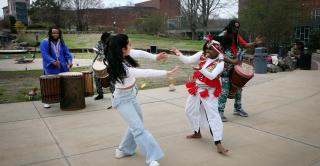

One of our favorite activities as gerontology educators is facilitating intergenerational connection. The Working Together: Intergenerational Student/Senior Exchange program, better known as WISE, is an intergenerational service-learning program created by Dr. Andreoletti who was inspired by a poster session while attending her first AGHE meeting in 2012.
The goal of WISE is to promote intergenerational communication and understanding, dispel age stereotypes, and foster well-being and generativity. By partnering with local senior centers and senior living communities the service we provide is free programming that offers the opportunity for social connection. The learning part of the equation involves both younger and older adults realizing their assumptions about each other may not be correct. Participants are often pleasantly surprised by how much they have in common despite their age differences. As many of our students are already balancing multiple responsibilities (i.e., school, work, and family obligations), participating in traditional service-learning experiences is often not an option.
To address this challenge, WISE was designed as a brief service-learning experience that takes place during regular class time. In a typical semester, a group of eight to ten older adults meet with students for two to three class periods. During the meetings, which take place either on campus or in the community, participants are placed in small groups with one to two older adults and three to four students.
The first session is focused on developing rapport through an ice-breaker activity we call “speed greeting” (Andreoletti & Montepare, 2018). Subsequent sessions generally have a theme (e.g., technology, relationships) or might involve creative team building activities. WISE has been integrated into a range of classes over the years by Drs. Andreoletti and June, including introduction to gerontology, adult development and aging, positive psychology, and even an interdisciplinary honors class that examined gains, losses, and resilience in psychological science and literature.
Research has demonstrated the program’s efficacy for decreasing age stereotypes in college students and increasing feelings of generativity in older adults (Andreoletti & Howard, 2018; June & Andreoletti, 2018). Over the years we have witnessed repeatedly the power of conversation and social connection for changing attitudes and fostering positive emotions, something we need now more than ever!



